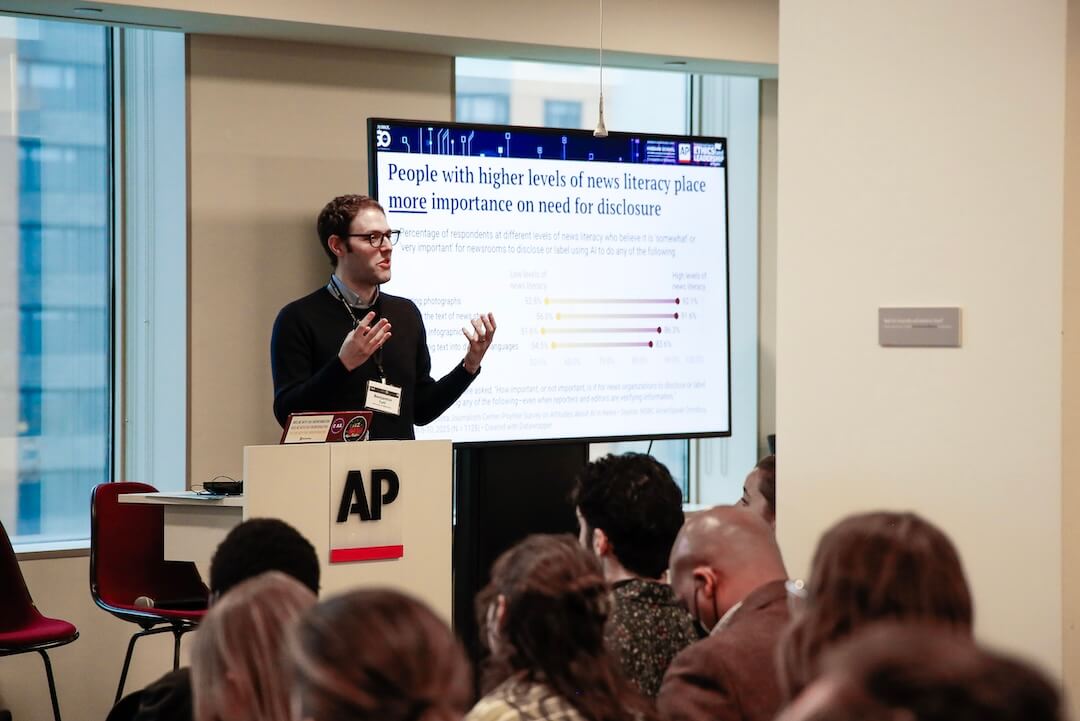In May, Justin Baxley was one of several dozen presenters at a closing summit for the Poynter-Koch Media and Journalism Fellowship. Like the others, he’d worked on an innovation project, something meant to improve a journalist’s newsroom, community or simply create great content that could move the needle on readership or viewership.
When Baxley presented his innovation project, titled More Than A Number, it became clear that the project was very, very personal. The project aimed to make it easier and more humane for families of homicide victims to engage with local media. Some in the room who didn’t know the project’s origin were stunned when they found out Baxley’s motivation: In 2017, his father Michael Baxley was murdered in his home. The last slide of the presentation included a photo of Michael Baxley holding his young son, Justin, in his arms.
Many tears were shed in the room, but that wasn’t the reason More Than A Number tied for a first-place prize as a top project for the fellowship. The project sought to change the way local newsrooms engage with the families of crime victims; when it happened to him, Justin Baxley said he didn’t speak to reporters; he ignored repeated requests for comment. He couldn’t handle it and wasn’t ready to tell his father’s story.
Now, he’s not only getting to tell that story, but to help other families in the same position. In August, the TV station where he works as a digital content manager, 13WMAZ in Macon, Georgia, officially launched More Than A Number as a community initiative. Meetings were held with nonprofits, police, elected officials and the public. Several memorial pages went up on the station’s website, and a half-hour special aired on the station at 5:30 p.m., a prime viewing spot, as part of the launch.
Baxley said he knew he wanted to do the project even before he had been accepted into the fellowship; how the media approaches crime victims when they are at their most vulnerable had been weighing on him as someone who had been directly impacted.
“I was put in the right place with the right folks,” Baxley said. “The thing with journalism is, unfortunately, we have a mindset of, ‘We’ve always done things a certain way, so that’s how we should continue to do it.’ This is hundreds of years of a practice that is traumatizing to victims’ families. We shouldn’t be doing it this way.”

Justin Baxley presents his innovation project, More Than A Number, at the closing summit for the 2022-2023 Poynter-Koch Media and Journalism Fellowship in May. The project, which offers resources for families of homicide victims, also looks to change the way newsrooms interact with victim families. (Photo: Gil Asakawa)
In his presentation to the fellowship, Baxley focused on ways to make that interaction more humane. The families of crime victims would have more agency over how quickly and how often a media outlet contacts them (including choosing not to comment at all), and would be given more time to respond and to have more say in how their loved one is portrayed.
“Letting them have control is what this thing is really about,” he said.
But after the presentation, Baxley decided to expand More Than A Number to make it even more useful to those families. “I did not want it to come across as just serving that interaction between us and them; I didn’t want it to be just that.”
He thought about one of the worst aspects of losing his father beyond the attention it generated.
“The first thing that came to mind was I did have to clean up the crime scene. Nobody should ever have to clean up their loved one’s blood off of where they’ve been shot,” Baxley said. “The fact that I had to do it was awful. The sad part is, I didn’t have to do that. There are certified cleaners who will do it for free. A homeowner’s policy also covers cleanup of a crime scene.”
Baxley began collecting information on resources like that, including ways to handle the costs of funeral arrangements and finding low-cost counseling. That became part of a Victim’s Resource Guide offered by the station on its website. In addition to that guide, the station is working on an internal guide for staffers that will better help journalists learn how to interact with the families of crime victims.
Working on More Than A Number has been both rewarding and very, very tough. The parent company of the station, Tegna, has expressed interest in expanding the project to other stations; it’s monitoring the response that 13WMAZ receives on its efforts. Baxley has thrown himself into the work, including distributing hundreds of cards with a QR code linking the resource guide. Local law enforcement agreed to give these cards out to families.
Baxley has had the support of family, including his mother and stepfather, and staffers at his station, but still struggles with the work. “It was like reliving the trauma every day, which is really hard. It’s the most challenging thing I’ve dealt with. We’re going on six years of my dad’s case being unsolved and there’s not a day that goes by that I don’t think about it.”
Baxley has taken a few days off to recover, but he remains committed to seeing it through with hopes that he can continue to help change the industry’s approach to covering victims of homicides.
“If it was just for me, I could absolutely take a few extra days. But there’s a lot of people in our community that are going to be counting on this type of project,” he said.
This story is part of a series profiling innovation projects from the 2022-2023 Poynter-Koch Media and Journalism Fellowship. The projects were presented at a May summit in Washington, D.C.






